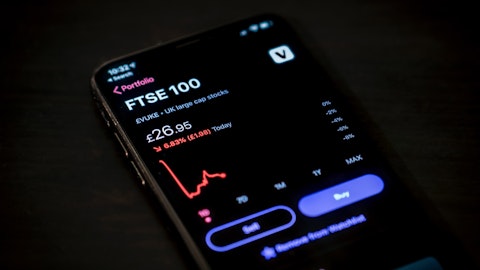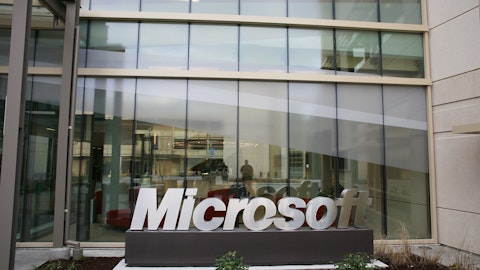In this article, we discuss the 5 best international stocks in 2021. If you want to read our detailed analysis of these stocks, go directly to the 10 Best International Stocks In 2021.
5. AstraZeneca PLS (NASDAQ: AZN)
Number of Hedge Fund Holders: 37
AstraZeneca PLS (NASDAQ: AZN) ranks fifth on the list of 10 best international stocks in 2021. The pharmaceutical company is based in the United Kingdom.
Earlier this year, AstraZeneca PLS (NASDAQ: AZN) purchased pharmaceutical company Alexion Pharmaceuticals for $39 billion. The acquisition is motivated by AstraZeneca’s aim to strengthen its position in immunology.
On August 12th, JPMorgan analyst James Gordon resumed coverage on AstraZeneca PLS (NASDAQ: AZN) with an Overweight rating. The analyst mentioned that he believes that a re-rating of the stock is possible.
The company has a market cap of $181.70 billion and currently offers a dividend yield of 2.39%. In the second quarter of 2021, AstraZeneca PLS (NASDAQ: AZN) reported an EPS of $0.45, missing estimates by $0.24. However, the company’s second-quarter revenue came in at $8.22 billion, beating revenue estimates by $724.60 million. Shares of AstraZeneca PLS (NASDAQ: AZN) gained 4.66% in the last twelve months and 17.24% year-to-date.
4. Baidu, Inc. (NASDAQ: BIDU)
Number of Hedge Fund Holders: 59
Baidu, Inc. (NASDAQ: BIDU) is a China-based multinational company and it ranks fourth on the list of 10 best international stocks in 2021. The company markets internet-related services and artificial intelligence products. The company also operates in Japan, the USA, Thailand, Brazil, Egypt, and Indonesia.
In 2020, Baidu, Inc. (NASDAQ: BIDU) agreed to purchase the live streaming business of JOYY Inc. (NASDAQ: YY) for $3.6 billion. This purchase will provide YY Live access to Baidu’s vast user base.
On June 1st, Mizuho analyst James Lee maintained a Buy rating on Baidu, Inc. (NASDAQ: BIDU) with a $350 per share price target. Lee believes that Baidu’s cloud solutions will work in a variety of industries.
The company has a market cap of $53.32 billion. In the second quarter of 2021, Baidu, Inc. (NASDAQ: BIDU) reported an EPS of $2.38, beating estimates by $0.32. The company’s second-quarter revenue came in at $4.84 billion, beating estimates by $51.58 million.
Horos Asset Management mentioned Baidu, Inc. (NASDAQ: BIDU) in its Q1 2021 investor letter:
“We have also fully exited our stake in Baidu, following their outstanding performance during the period and their lower relative upside potential compared to other investment alternatives, which we will discuss below.
The Chinese technology platform company Baidu has also been held in the portfolios managed by Alejandro, Miguel, and myself for several years. During this period, we have seen very high volatility in its share price, which we have taken advantage of to make significant rebalancing moves in our position (in fact, we even sold our entire position once, when we thought the stock’s upside potential was exhausted). After several years of instability, market sentiment turned very positive, putting an end to the historical advertising problems in the healthcare sector, the divestments in O2O (Online-to-Offline) businesses that continued to weigh on the company’s margins, the IPO of part of the iQiyi streaming business (which hid Baidu’s underlying cash generation capacity) and the tough competition from other industry giants such as Tencent and Alibaba, as well as the entry of new players with disruptive business models (ByteDance). At the same time, the company’s recent commitment to electric vehicles contributed even more to this change of narrative. Baidu’s share price rose almost fourfold from the March 2020 lows to all-time highs and reached a valuation where the margin of safety, in our view, was too narrow.”
3. Taiwan Semiconductor Manufacturing Company Limited (NYSE: TSM)
Number of Hedge Fund Holders: 64
Taiwan-based multinational semiconductor manufacturer Taiwan Semiconductor Manufacturing Company Limited (NYSE: TSM) ranks third on the list of 10 best international stocks in 2021. Taiwan Semiconductor Manufacturing Company Limited (NYSE: TSM) operates in North America, Europe, Japan, China, and South Korea.
On July 13th, Needham analysts maintained a Buy rating on Taiwan Semiconductor Manufacturing Company Limited (NYSE: TSM) and raised the price target to $138 from $135 per share.
2. Apple Inc. (NASDAQ: AAPL)
Number of Hedge Fund Holders: 138
Apple Inc. (NASDAQ: AAPL) is a California-based multinational technology company that ranks second on the list of 10 best international stocks in 2021. Apple Inc. (NASDAQ: AAPL) markets in over 175 countries with its biggest market in the US accounting for over 45% of Apple’s net sales.
This August, JPMorgan analyst Samik Chatterjee raised the price target of Apple Inc. (NASDAQ: AAPL) to $180 per share from $175 per share and reiterated his Overweight rating on the stock.
1. Alibaba Group Holding Limited (NYSE: BABA)
Number of Hedge Fund Holders: 146
Topping the list of 10 best international stocks in 2021 is China-based multinational technology company Alibaba Group Holding Limited (NYSE: BABA).
On September 11th, KGI Securities initiated coverage on Alibaba Group Holding Limited (NYSE: BABA) with a Neutral rating and a HK$205 per share price target.
The company has a market cap of $441.13 billion. In the first quarter of 2022, Alibaba Group Holding Limited (NYSE: BABA) reported an EPS of $2.57, beating estimates by $0.35. The company’s first-quarter fiscal 2022 revenue came in at $31.8 billion, up 34% year-over-year.
Tweedy, Browne Company LLC, mentioned Alibaba Group Holding Limited (NYSE: BABA) in its Q2 2021 investor letter:
“A position that we established around year-end, and have added to across three of our Funds during the quarter, is Alibaba, the Chinese internet giant. Our pricing opportunity in these shares is in part related to increased regulatory scrutiny of the internet sector by the Chinese government which we continue to monitor closely.
Alibaba is the largest e-commerce company in China, with over 50% market share in terms of gross merchandise value. We first purchased Alibaba for the Funds around calendar year-end. Its core consumer marketplace businesses consist of Taobao (China’s largest consumer-to-consumer online shopping destination) and Tmall (China’s largest third-party platform for brands and retailers). Additionally, Alibaba operates the dominant cloud platform in China (AliCloud), international e-commerce operations (Lazada, etc.), and digital media services, and has several strategic investments, including a 33% stake in Ant Financial.
Alibaba’s share price weakened significantly in Q4 2020 due to increasing regulatory scrutiny, including a pulled IPO of Ant Group that was originally set for November, 2020. In November, the State Administration of Market Regulation (SAMR) unveiled draft amendments to China’s Anti-Monopoly Law that extended the law to internet platforms, prohibiting practices such as platform exclusivity, predatory pricing, and price discrimination based on user data, among others. SAMR also initiated an official antitrust investigation into Alibaba and Ant Group in December. At time of purchase, we thought the SAMR investigation into Alibaba’s core e-commerce business would have a somewhat limited impact, as many merchants are already on multiple platforms, but are attracted to Alibaba because of its strong ecosystem, traffic and marketing efficiency. There are network effects associated with a very large user and merchant base. The large Alibaba ecosystem (including local services, payments, etc.) also allows data integration across various scenarios to enable more targeted solutions to merchants and customers. Alibaba’s core marketplace business is a strong cash generator. We believe it should continue to grow with the e-commerce sector, driven by growing consumption in China and penetration into newer categories.
Alibaba also has continued to invest significantly in newer initiatives, such as Taobao Deals and Taobao Grocery, to extend the growth runway of the company.
In April 2021, the SAMR announced a $2.75bn fine on Alibaba for its violations of the Anti-Monopoly Law, putting an end to the bulk of the regulatory review and overhang. The fine equated to 4% of revenue and a minor portion of Alibaba’s net cash ($51bn as of December 31, 2020). Management does not expect any material impact on its business from the change in exclusivity arrangement imposed by regulators. Ant Financial could face greater regulatory impacts, but it is a relatively small part of our total valuation of Alibaba, so the downside is limited in our view. At time of purchase, Alibaba sold for less than 12x its estimated core “marketplace” EBITA, after deducting values for its other assets (i.e., international commerce, cloud, and new media) from Enterprise Value. We valued the company’s cloud business using an operating margin similar to Amazon Web Services (AWS) and a 15x operating multiple. While the cloud business just turned marginally profitable last quarter, Alibaba is a significant leader in the industry (≈40% market share) and has first-mover advantages. As can be seen from AWS, cloud is an industry with strong economies of scale and high switching costs. China’s cloud industry is less mature than in the U.S., and Alibaba has been investing significantly to grow scale (AliCloud grew revenue over 50% in 2020), and in the longer-term we are optimistic that its operating margin can reach AWS levels. Alibaba’s management recently provided financial guidance indicating that all of the company’s incremental operating profit this year (fiscal 2022) would be reinvested into new initiatives. As a result, the company’s operating profit will be relatively flat this year. We do not believe this changes the long-term earnings growth rate or value of the business.
In addition to Alibaba, our Funds own interests in several additional Chinese companies including Dali Foods, a snack foods company; A-Living, a property management business; Baidu, which has at times been referred to as the Chinese Google; Shanghai Mechanical and Electrical, which markets and manufactures elevators; and several Hong Kong based businesses. All of these additional investments, including Alibaba, constitute approximately 8% of the total assets of the International Value Fund. First and foremost, all of these investments were made at prices that were at substantial discounts from our estimates of intrinsic value, and the underlying businesses, in our view, have the potential for higher return profiles than many of our other investments. Secondly, economic growth rates in China and other parts of the Far East significantly exceed those of most Western economies. China is currently the second largest economy in the world, and may become the largest economy in the not-too-distant future. Thirdly, while the Chinese government has more recently increased its regulatory oversight of a number of industries, in part to achieve broad social objectives, we do not believe these actions will ultimately impair the efficacy and value of the investments we have made. We will continue to manage our risk by exercising extreme price sensitivity when making purchases, diversifying our exposure, focusing our attention on businesses that are not in the “cross hairs” of the Chinese government, and by limiting our overall portfolio allocation to no more than 10% of total portfolio assets at cost. As an aside, we were also encouraged to see that the Daily Journal, a company whose Chairman is Charlie Munger, recently established a meaningful position in Alibaba.”
You can also take a peek at the 15 Most Valuable Gaming Companies in the World and 10 Best European Bank Stocks to Buy Now





